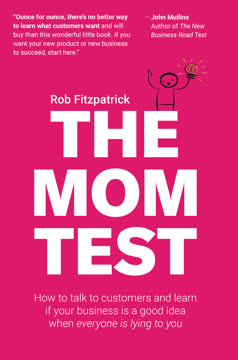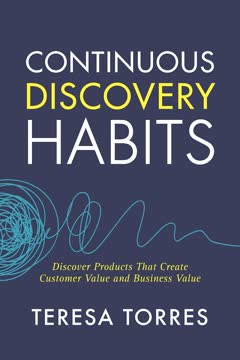Key Takeaways
1. Data-driven decision making is crucial for startup success
If you can't measure it, you can't manage it.
Measure to succeed. In the startup world, gut feelings and assumptions can be misleading. Data-driven decision making allows entrepreneurs to validate ideas, identify problems, and optimize solutions quickly and efficiently. By collecting and analyzing relevant metrics, startups can:
- Identify and focus on the most critical aspects of their business
- Make informed decisions based on evidence rather than guesswork
- Adapt and pivot more effectively when faced with challenges
Avoid vanity metrics. Not all data is created equal. Startups must focus on actionable metrics that drive real business value, rather than vanity metrics that may look impressive but don't translate to meaningful progress. Examples of vanity metrics include:
- Total registered users (without considering active users)
- Page views (without conversion rates)
- Total funding raised (without considering burn rate and runway)
2. The One Metric That Matters (OMTM) focuses efforts and drives growth
At any given time, there's one metric you should care about above all else.
Laser focus. The OMTM concept encourages startups to identify and focus on the single most important metric for their current stage and business model. This approach:
- Aligns the entire team around a common goal
- Simplifies decision-making processes
- Enables rapid iteration and improvement
Choose wisely. The OMTM should be:
- Actionable: Directly influenced by your actions
- Comparative: Measurable over time or against competitors
- Understandable: Easy for everyone in the organization to grasp
- Changeable: Evolving as the business grows and priorities shift
Examples of OMTM for different stages:
- Idea validation: Problem interview completion rate
- MVP testing: User engagement rate
- Growth: Viral coefficient
- Revenue: Customer Lifetime Value (CLV) to Customer Acquisition Cost (CAC) ratio
3. Lean Analytics stages guide startups from idea to scale
Lean Startup is really about getting you to focus on the right thing, at the right time, with the right mindset.
Five stages of growth. The Lean Analytics framework outlines five distinct stages that startups typically progress through:
- Empathy: Understanding customer problems and needs
- Stickiness: Creating a product that engages users
- Virality: Encouraging user growth through word-of-mouth and referrals
- Revenue: Monetizing the product or service
- Scale: Expanding the business to new markets or segments
Stage-specific focus. Each stage has its own set of priorities, challenges, and key metrics to track. By understanding which stage they're in, startups can:
- Set appropriate goals and expectations
- Allocate resources more effectively
- Avoid premature scaling or misdirected efforts
Startups should focus on mastering each stage before moving to the next, ensuring a solid foundation for sustainable growth.
4. Different business models require different key metrics
You need to figure out what business you're in, and then figure out what numbers matter for that kind of business.
Tailored analytics. Different business models have unique characteristics and success factors. The book outlines six common business models and their associated key metrics:
- E-commerce: Conversion rate, average order value, customer acquisition cost
- SaaS: Monthly recurring revenue, churn rate, customer lifetime value
- Mobile apps: Download rate, daily active users, average revenue per user
- Media sites: Page views, time on site, ad click-through rate
- User-generated content: Content creation rate, engagement funnel, virality
- Two-sided marketplaces: Liquidity, matching rate, transaction volume
Model-specific optimization. By focusing on the metrics most relevant to their business model, startups can:
- Identify areas for improvement more accurately
- Benchmark performance against industry standards
- Make data-driven decisions that align with their specific goals and challenges
5. Setting realistic baselines is essential for measuring progress
Unless you have a line in the sand, you don't know whether you're doing well or badly.
Benchmark for success. Establishing realistic baselines and targets for key metrics allows startups to:
- Measure progress objectively
- Set achievable goals
- Identify when to pivot or persevere
Industry standards. While every startup is unique, industry benchmarks can provide valuable context:
- E-commerce conversion rates: 1-3% for most sites, 7-15% for top performers
- SaaS churn rates: 5-7% monthly for early-stage, 1-2% for mature businesses
- Mobile app retention: 40-60% after 30 days, 20-40% after 90 days
Continuous improvement. Regularly reassess and adjust baselines as the business evolves and market conditions change. This ensures that goals remain challenging yet attainable.
6. Customer development and continuous learning are fundamental
Don't sell what you can make; make what you can sell.
Listen and learn. Customer development is a crucial process for validating assumptions and refining product-market fit. Key principles include:
- Conducting problem interviews to understand customer pain points
- Running solution interviews to validate proposed offerings
- Building minimum viable products (MVPs) to test key hypotheses
Iterate rapidly. The build-measure-learn feedback loop is essential for continuous improvement:
- Build: Create a minimal version of a product or feature
- Measure: Collect data on user behavior and feedback
- Learn: Analyze results and generate new insights
- Repeat: Use learnings to inform the next iteration
This approach allows startups to:
- Minimize wasted resources on unvalidated ideas
- Adapt quickly to changing market conditions
- Develop products that truly resonate with customers
7. Analytics must be balanced with intuition and adaptability
Data-driven machine optimization, when not moderated by human judgment, can cause problems.
Human element. While data is crucial, successful startups also rely on:
- Founder intuition and industry expertise
- Qualitative feedback from customers and team members
- Adaptability in the face of unexpected challenges or opportunities
Avoid analysis paralysis. Over-reliance on data can lead to:
- Missed opportunities due to slow decision-making
- Inability to innovate beyond current metrics
- Neglect of important but difficult-to-measure factors
Balanced approach. Combine data-driven decision making with:
- Regular customer interactions and empathy-building exercises
- Cross-functional team discussions to interpret data holistically
- Flexibility to experiment with unconventional ideas
8. Lean Analytics applies to enterprises and intrapreneurs too
Software eats everything.
Beyond startups. Lean Analytics principles can be applied in various contexts:
- Established enterprises seeking innovation
- Intrapreneurs driving change within large organizations
- Non-profit organizations optimizing for impact
Overcoming challenges. Adapting Lean Analytics to larger organizations requires:
- Executive buy-in and support
- Clear alignment with existing business objectives
- Careful navigation of internal politics and stakeholder management
Benefits for enterprises:
- Faster innovation cycles
- Improved resource allocation
- Data-driven culture shift
Intrapreneur strategies:
- Start small with focused experiments
- Demonstrate value quickly to gain support
- Leverage existing resources and unfair advantages
- Balance disruptive innovation with organizational constraints
By applying Lean Analytics principles across different contexts, organizations of all sizes can foster a culture of continuous improvement and data-driven decision making.
Last updated:
FAQ
What's Lean Analytics about?
- Data-Driven Decisions: Lean Analytics by Alistair Croll and Benjamin Yoskovitz focuses on using data to make informed decisions in startups, providing a framework for understanding which metrics matter at different stages.
- Stages of Growth: It outlines five key stages—Empathy, Stickiness, Virality, Revenue, and Scale—each with specific metrics to track, helping entrepreneurs focus on what matters most.
- Actionable Insights: The book offers practical advice and case studies to illustrate how to apply analytics effectively, helping startups avoid common pitfalls and make better strategic choices.
Why should I read Lean Analytics?
- Improve Startup Success: The book provides a data-driven approach that can significantly enhance the chances of startup success by identifying the right metrics to track.
- Framework for Measurement: It offers a clear framework for measuring key performance indicators (KPIs) relevant to your business model, focusing on metrics that truly matter.
- Real-World Examples: Numerous case studies from successful startups make the concepts relatable and easier to understand, illustrating how analytics can drive growth and innovation.
What are the key takeaways of Lean Analytics?
- One Metric That Matters: Focus on a single key metric that drives your business forward, helping streamline efforts and avoid distractions from less impactful metrics.
- Avoid Vanity Metrics: Distinguish between actionable metrics that drive behavior and decision-making, and vanity metrics that may look good but do not provide real insights.
- Iterative Learning: Emphasizes a build-measure-learn cycle, where startups continuously test hypotheses and iterate based on data, fostering a culture of experimentation and adaptability.
What are the stages of growth outlined in Lean Analytics?
- Empathy Stage: Focuses on understanding customer problems and validating whether they are worth solving through interviews and qualitative feedback.
- Stickiness Stage: Aims to build a product that users find engaging and want to return to, with metrics like daily active users and retention rates becoming crucial.
- Virality Stage: Leverages word-of-mouth and referrals to grow the user base, emphasizing the importance of creating a product that users want to share.
- Revenue Stage: Concentrates on monetization strategies and optimizing revenue streams, understanding customer lifetime value and acquisition costs.
- Scale Stage: Involves expanding the business and reaching new markets, focusing on scaling operations and maintaining growth momentum.
What is the One Metric That Matters (OMTM) in Lean Analytics?
- Critical Focus Metric: The OMTM is the single most important metric that a startup should focus on at any given time, maintaining clarity and direction in analytics efforts.
- Dynamic Nature: It changes as the startup progresses through different stages, shifting from user acquisition metrics to retention metrics as the product matures.
- Guides Decision-Making: Concentrating on the OMTM helps entrepreneurs make more informed decisions and prioritize actions that drive growth.
How does Lean Analytics define actionable metrics?
- Actionable vs. Vanity Metrics: Actionable metrics directly influence decision-making and behavior, while vanity metrics may look impressive but do not provide real insights.
- Examples of Actionable Metrics: Metrics like conversion rates, customer acquisition costs, and churn rates inform strategic decisions and help understand business health.
- Importance of Context: Metrics should be contextualized within the business model, understanding how they relate to overall goals is crucial for effective analysis.
What is the Lean Canvas and how is it used in Lean Analytics?
- Visual Business Model: The Lean Canvas is a one-page visual tool to outline a business model, including sections for problems, solutions, key metrics, and unique value propositions.
- Focus on Risks: It helps identify the riskiest parts of a business model, allowing entrepreneurs to prioritize efforts and validate assumptions before heavy investment.
- Continuous Updates: Meant to be a living document that evolves as the business grows, entrepreneurs should regularly revisit and update it based on new insights and data.
What is the Problem-Solution Canvas mentioned in Lean Analytics?
- Tool for Focus: A two-page document designed to help startups maintain focus on their key problems and solutions, encouraging teams to prioritize issues and track progress.
- Weekly Updates: Founders are encouraged to fill out the canvas weekly, fostering accountability and keeping the team aligned on objectives.
- Hypothesized Solutions: Includes a section for hypothesized solutions, allowing teams to experiment and measure the effectiveness of their proposed fixes.
How can I apply the concepts from Lean Analytics to my startup?
- Identify Your Stage: Determine which stage of growth your startup is in and focus on the relevant metrics for that stage to guide your analytics efforts.
- Use the Lean Canvas: Create and regularly update a Lean Canvas to outline your business model and identify key risks, staying focused on what matters most.
- Establish Your OMTM: Define your One Metric That Matters for your current stage and ensure all efforts are aligned with improving that metric.
- Iterate and Experiment: Embrace a culture of experimentation by continuously testing hypotheses and iterating based on data, fostering learning and adaptability.
What are some common pitfalls in using analytics according to Lean Analytics?
- Overemphasis on Data: Entrepreneurs can become overly focused on data, leading to analysis paralysis; balance data-driven decisions with intuition and experience.
- Ignoring Qualitative Insights: Relying solely on quantitative data can overlook important qualitative insights; combine both types of data for a comprehensive understanding.
- Failing to Define Success: Without clear definitions of success for each metric, startups may struggle to measure progress effectively; establish benchmarks and goals for meaningful analysis.
How does Lean Analytics suggest measuring customer engagement?
- Define Active Users: Emphasizes defining what constitutes an active user for your business, based on specific actions like logins or feature usage.
- Track Engagement Metrics: Measure metrics like time spent on the platform, frequency of use, and user retention rates to gain insights into user engagement.
- Use Cohort Analysis: Implement cohort analysis to track user behavior over time, identifying trends and patterns in user engagement.
What are the best quotes from Lean Analytics and what do they mean?
- “Your competition will use this book to outgrow you.”: Emphasizes the importance of leveraging analytics to stay competitive, suggesting that understanding and applying the principles can provide a significant advantage.
- “If you can’t measure it, you can’t manage it.”: Highlights the necessity of metrics in effective management, underscoring the idea that without measurement, it’s challenging to assess progress and make informed decisions.
- “Lean Analytics is the missing piece of Lean Startup.”: Points to the integration of analytics within the Lean Startup methodology, suggesting that data-driven insights are essential for successfully implementing Lean principles.
Review Summary
Lean Analytics receives mostly positive reviews for its practical insights on data-driven decision-making in startups. Readers appreciate its comprehensive coverage of business models, metrics, and growth stages. Many find it useful for entrepreneurs, product managers, and data analysts. The book is praised for its abundance of examples and case studies. Some readers note that while dense with information, it can be dry at times. A few mention that certain sections may be more relevant depending on one's business stage or experience level.
Similar Books










Download PDF
Download EPUB
.epub digital book format is ideal for reading ebooks on phones, tablets, and e-readers.




